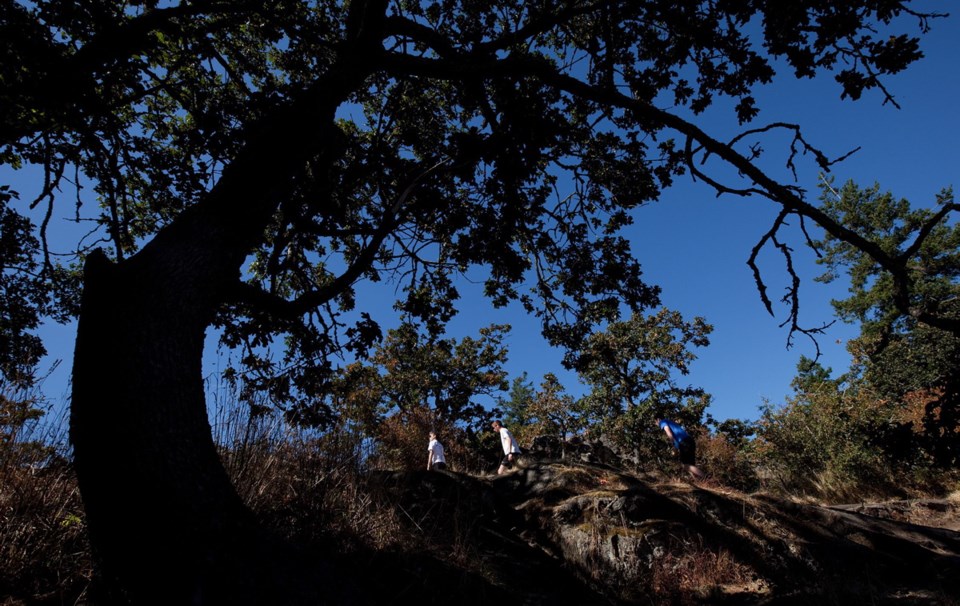Mount Doug is named for:
A. Doug, the first local high school student to lose his virginity in the back of a Studebaker after the hilltop parking lot opened.
B. Sir Geoffrey Mount, inventor of the horse.
C. Sir James Douglas, the so-called Father of British Columbia and possessor of enough African blood to be celebrated — at least in the Great White North — as a pillar of Black History Month.
D. The same Sir James Douglas, except the one whose name is synonymous with the unfulfilled Douglas Treaties. Think of having a landmark named after the guy who sweet-talked you into your cellphone plan.
There’s a move afoot to have Mount Douglas revert to its aboriginal name, Pkols. Layered with political overtones, it’s the kind of initiative that inspires sputtering indignation among cranky right-wing guys who think natives “should go back to where they come from,” and enthusiasm among left-wing white boys eager to see indigenous people shed the cloak of cultural imperialism, Stick It To The Man and assert their independence, just as long as said independence is asserted in a manner acceptable to left-wing white boys (no logging/McDonald’s/voting for Christy).
Think of one of those TV spots: “A part of Canada’s heritage: Self-righteous non-Aboriginals telling Aboriginals what’s best for them.”
There is some precedent for restoring aboriginal place names. Iqaluit, the capital of Nunavut, was Frobisher Bay until 1987. Following the Nisga’a Treaty, the Nass River villages of Kincolith, Greenville, Canyon City and New Aiyansh became Gingolx, Laxgalts’ap, Gitwinksihlkw and Wii Lax Kap. In 2009, the Queen Charlotte Islands were officially rebranded Haida Gwaii, though the latter name was itself a 1980s invention.
And at least Pkols — pronounced p’cawls — is easy to both say and spell. Some traditional names are daunting for natives and non-natives alike. I once watched a former national chief of the Assembly of First Nations repeatedly stumble over the pronunciation of Gilford Island’s Kwicksutaineuk-ah-kwaw-ah-mish band; it was like watching a Westfalia attempt run after run up an icy hill on bald tires. On another occasion, when a Times Colonist reporter asked a Vancouver Island elder to spell the name of his band, the elder replied “Oh, God, I don’t know any more.” He belonged to what had been the Kyuquot band, but was now the Ka:’yu:’k’t’h’/Che:k’tles7et’h’ Nation.
Don’t know if the Pkols idea will fly, though. Government’s dominant rule when weighing applications to alter geographical terms is that it won’t go against common local usage. Victorians (our motto: “We fear change”) who balk at new titles for shopping centres or hockey rinks know the hill as Mount Doug. Residents who are still bitter about having the West Shore (or is it Westshore?) jammed down their throats in place of the Western Communities might have trouble swallowing Pkols. Change would require persuasion, not prescription.
Still, geographical names do shift with changing sensibilities. In B.C., a dozen or so Squaw creeks, lakes, mountains and islands were retitled over the years. The twin peaks known as Sheba’s Breasts were renamed Sheba Mountain. Chinaman Lake disappeared from the B.C. atlas in 1996.
Earlier deletions included — jeez, it’s even hard to type this — Chink Creek and Niggertoe Mountain. Up-Island, Jap Mountain became Nikkei Mountain in 2002. Some ancient places were rechristened simply because of the way they sounded to English ears: Vancouver Island lost both Kokshittle Arm and Kowshet Cove in the 1930s.
Some communities embrace change as an opportunity, seeing potential in reinvention. In 1993, the town of Ismay, Montana, temporarily renamed itself Joe after the NFL quarterback. The municipality of Jim Thorpe, Pennsylvania, got its name after working out a deal with the athlete’s widow, who had his remains entombed in a monument there. In 1950, Hot Springs, New Mexico became Truth Or Consequences after the radio quiz show’s host announced he would broadcast from the first community to rename itself after the program.
The point being that nothing is carved in stone, and there’s no use getting caught up in polarizing debate when we can have a healthy discussion instead. No point making a mountain out of a 690-foot molehill.



